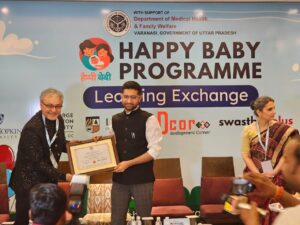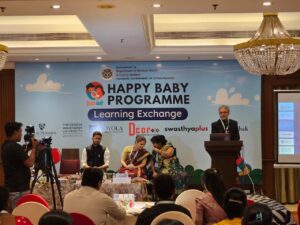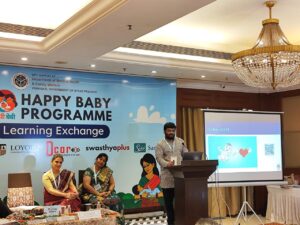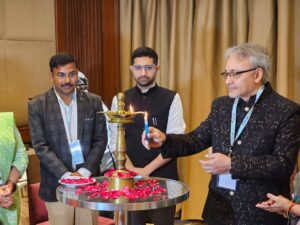Sidharth Rath
Study found that the programme significantly improved young mothers’ confidence in vaccines and led to a stronger desire to get their children vaccinated.
 A combination of WhatsApp and an artificial intelligence (AI) chatbot was successfully used to promote children’s vaccination from the Happy Baby Programme in the slum areas of Varanasi. The innovative Programme sent chatbot-driven messages on WhatsApp to mothers of young children to remind them about the upcoming vaccinations days, congratulatory messages (for vaccinating their child), and important information about vaccines.
A combination of WhatsApp and an artificial intelligence (AI) chatbot was successfully used to promote children’s vaccination from the Happy Baby Programme in the slum areas of Varanasi. The innovative Programme sent chatbot-driven messages on WhatsApp to mothers of young children to remind them about the upcoming vaccinations days, congratulatory messages (for vaccinating their child), and important information about vaccines.

“We are thrilled about the study findings,” said the Principal Investigator Dr. Rajiv N. Rimal, Professor at Johns Hopkins University in the United States. He added, “This was a strong partnership with and supported by the government of Uttar Pradesh, and anything we can do to improve the lives of mothers and young children in Varanasi is of high priority.”
Odisha’s Swasthya Plus Network & DCOR play a crucial role in the Happy Baby Programme, with Swasthya Plus Network leading the design of the chatbot. Their collaboration underscores a significant effort to enhance healthcare outreach through technology.

Happy Baby Programme, designed as a WhatsApp chatbot, explores new technologies such as AI and has the potential to reach people at scale with personalized messaging to ensure full immunisation of their children. “Engaging content on WhatsApp as an interactive chatbot personalised with AI is a promising & effective tool for governments and organisations to progress towards full immunization,” said Sidharth Rath from Swasthya Plus Network, responsible for the design of the chatbot.
“Our frontline workers are usually very busy, and the Happy Baby Programme appears to have brought some relief to them, together with promoting vaccination,” said Mr. Himanshu Nagpal, Chief Development Officer of Varanasi.

The study found that users of the Happy Baby Programme significantly improved their confidence in vaccines and in the level of trust they placed toward the health system. An innovative part of the study was the use of what researchers call social network analysis (SNA). This helped to understand how the connections that people have with each other can stimulate childhood vaccination communications, norms and attitudes. “It was noteworthy that people’s primary network for vaccine information was their immediate or distant family,” reported Dr. Neil Alperstein from Loyola University Maryland, who oversaw the SNA component of the study.
In the research study, participants received messages about vaccination and other health issues like handwashing, nutrition, and breastfeeding. Findings showed that those who received the messages were significantly more likely to have positive attitudes toward vaccines and express more trust in the health system.
Dr. Rimal highlighted that “Moms are usually working multiple jobs, including managing their own homes and feeding their families, which means they tend to have no free time. If technology can help them, we should promote those technologies like the Happy Baby Programme”.
The study was held in six slum areas: Bajardheeha, Kajjakpura, Konia, Lahartara, Nai Basti, and Shivpur. Representatives from the programme partners (Johns Hopkins University, George Washington University, and Loyola University Maryland, Swasthya Plus Network, Sarthak, and DCOR) were present at the event.




























